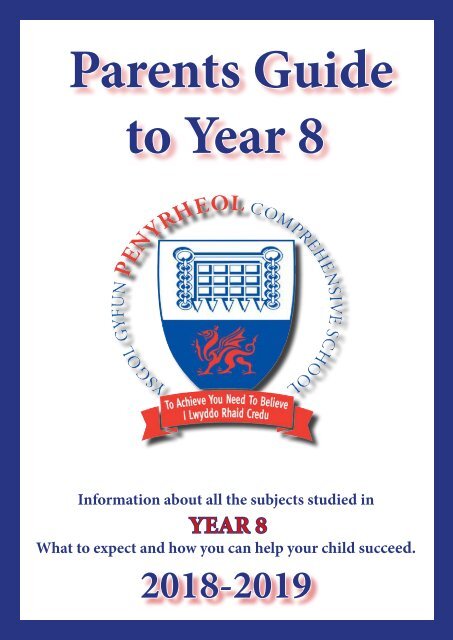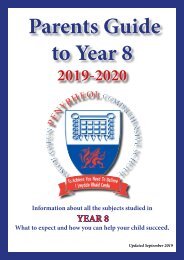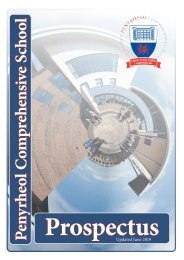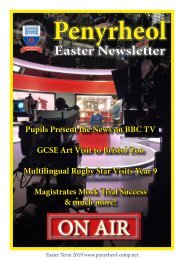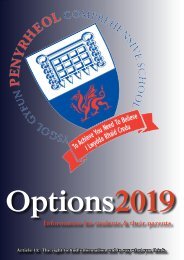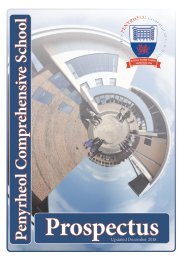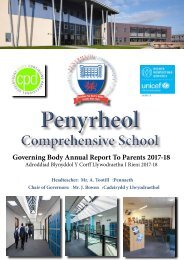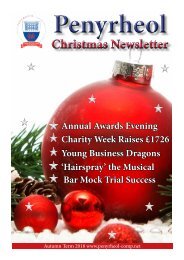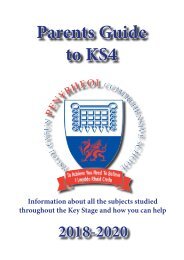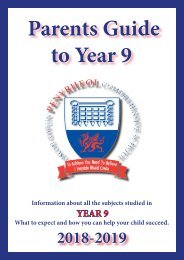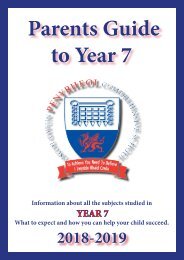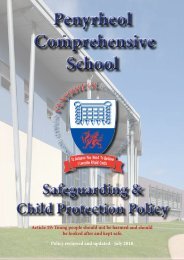Year 8 Parent Guide November 2018
Create successful ePaper yourself
Turn your PDF publications into a flip-book with our unique Google optimized e-Paper software.
<strong>Parent</strong>s <strong>Guide</strong><br />
to <strong>Year</strong> 8<br />
Information about all the subjects studied in<br />
YEAR 8<br />
What to expect and how you can help your child succeed.<br />
<strong>2018</strong>-2019
Key Dates in <strong>Year</strong> 8<br />
SCHOOL TERMS AND HOLIDAYS <strong>2018</strong>/19<br />
Mid Term Holidays<br />
Term Term Begins Terms Ends Begins Ends Term Begins Term Ends<br />
Autumn<br />
<strong>2018</strong><br />
Spring<br />
2019<br />
Summer<br />
2019<br />
Monday<br />
3rd<br />
September<br />
Monday<br />
7th<br />
January<br />
Monday<br />
29th<br />
April<br />
Friday<br />
26th<br />
October<br />
Friday<br />
22nd<br />
February<br />
Friday<br />
24th<br />
May<br />
Monday<br />
29th<br />
October<br />
Monday<br />
25th<br />
February<br />
Monday<br />
27th<br />
May<br />
Friday<br />
2nd<br />
<strong>November</strong><br />
Friday<br />
1st<br />
March<br />
Friday<br />
31st<br />
May<br />
Monday<br />
5th<br />
<strong>November</strong><br />
Monday<br />
4th<br />
March<br />
Monday<br />
3rd<br />
June<br />
Friday<br />
21st<br />
December<br />
Friday<br />
12th<br />
April<br />
Monday<br />
22nd<br />
July<br />
IMPORTANT DATES:<br />
<strong>Year</strong> 8 Interim Report Issued - 22nd <strong>November</strong> <strong>2018</strong><br />
<strong>Year</strong> 8 <strong>Parent</strong>s’ Evening - 11th March 2019<br />
<strong>Year</strong> 8 Examinations - 10th – 14th June 2019<br />
<strong>Year</strong> 8 End of <strong>Year</strong> Report Issued - 12th July 2019<br />
CONTACT INFORMATION:<br />
Telephone: 01792 533066<br />
Head of <strong>Year</strong>: Ms. S. Ensell-Lewis<br />
Pastoral Support Officer: Mrs.S. Morris<br />
School Website: www.penyrheol-comp.net<br />
Twitter: @Penyrheol
<strong>Guide</strong> for <strong>Parent</strong>s<br />
Welcome to the <strong>Year</strong> 8 <strong>Parent</strong> <strong>Guide</strong>! This booklet outlines the subjects that your child will be studying this<br />
year and it will hopefully provide you with advice on how you may best help your child succeed.<br />
A reminder of the basics:<br />
Organisation<br />
We cannot emphasise the importance of good organisation strongly enough and recommend that you<br />
encourage your child to:<br />
◆◆•<br />
◆◆•<br />
◆◆•<br />
◆◆•<br />
◆◆•<br />
Bring all the necessary books, kit and other equipment to school each day<br />
Pack his/her bag the night before<br />
Check his/her homework diary to ensure that all homework is completed on time<br />
Enter any important dates such as examinations, coursework deadlines and trips in their<br />
homework diary.<br />
Homework<br />
Homework is important – it either extends or reinforces the work, which has been done in class. Please<br />
check that the homework diary is kept up to date and sign it on a weekly basis. Please set aside a quiet area<br />
with a table and chair for your child to work and try and ensure each night a time when homework may be<br />
done, ideally before any leisure activities. Use the homework timetable to keep a check on your child’s work.<br />
We would be grateful if you will:<br />
Absence from School<br />
◆◆•<br />
◆◆•<br />
Telephone on the first day of absence;<br />
Send a note with your child when they return to school.<br />
The telephone call helps us to eliminate those children who are legitimately absent and we can then concentrate<br />
on phoning the parents of those children who are truanting. In the extreme case it would help us to raise<br />
the alarm early on if a child should go missing on the way to school.<br />
Uniform<br />
Please support us by ensuring that your child wears full school uniform every day. This will enable<br />
teachers to spend less time enforcing school uniform and concentrate more on actually teaching. Black<br />
footwear should be worn and jewellery must be restricted to one pair of earrings and one watch per pupil.
Presentation of Work<br />
1. Work must be presented neatly at all times.<br />
2. Always write in blue or black pen.<br />
3. Drawings or diagrams must be done in pencil but labelled in pen.<br />
4. Always write in your neatest handwriting.<br />
5. Lay out your work like this:<br />
Classwork/Homework<br />
Date<br />
Title of Work<br />
6. Put numbers or letters of questions in the margin.<br />
7. Write on the top line of every page and start near the margin.<br />
8. Write on every page. Don’t leave big gaps.<br />
9. No Tipp-Ex. Cross out with one straight line. Don’t use brackets<br />
instead of crossing out.<br />
10. No graffiti.<br />
It is your responsibility to copy up work missed due to absence and<br />
ensure your work is complete.
English<br />
What will your child study in <strong>Year</strong> 8?<br />
Head of Department: Miss. K. Jones<br />
Each half term, pupils will focus on a different theme in which they will encounter a variety of fictional and<br />
non-fictional texts.<br />
Reading<br />
Some texts will require very little reading but others will need more in-depth reading and will be<br />
more challenging. The texts will require different approaches and responses.<br />
Writing<br />
Some of the writing tasks will require a brief response whilst others will focus on extended writing. Pupils<br />
will write a variety of different text types, for example, descriptive, narrative, in-structional, informative<br />
and persuasive texts. Pupils will work on effective organisation of ideas in their writing but they will also be<br />
expected to write with grammatical accuracy and correct spelling: 50% of the marks will be given for spelling<br />
and grammar.<br />
Speaking and Listening<br />
Pupils will be involved in pair / group discussions as well as presenting individually.<br />
How will your child be assessed?<br />
Term Theme Key Task<br />
Autumn Term<br />
(1st half term)<br />
Autumn Term<br />
(2nd half term)<br />
Spring Term<br />
(1st half term)<br />
Spring Term<br />
(2nd half term)<br />
Summer Term<br />
Mystery and Suspense<br />
Gaming and socoal media<br />
Heroes and Villains<br />
Drama<br />
Choices and Fate<br />
Reading: Close reading of a short story.<br />
Writing: Opening of a story.<br />
Reading: Common assessment task.<br />
Writing: A discursive speech or issue.<br />
Speaking and Listening: Short individual presentation on a<br />
related topic.<br />
Reading: Close reading of a non-fiction text.<br />
Writing: A short narrative.<br />
Reading: Close reading of a play script<br />
Writing: A review of a play.<br />
Reading : Close reading of poetry.<br />
Writing: A formal letter or report.<br />
Speaking and Listening: Assessed group discussion.
English Continued<br />
How can you support your child?<br />
◆◆•<br />
◆◆•<br />
◆◆•<br />
◆◆•<br />
◆◆•<br />
◆◆•<br />
◆◆•<br />
◆◆•<br />
Making sure that all homework (written in diaries) is completed<br />
Reading with your child several times a week and talking about what you have read<br />
Having plenty of reading material at home such as books, newspapers and magazines<br />
Going through the spelling of words and testing your child on difficult words<br />
Having a dictionary and thesaurus available for use at home<br />
Discussing work that is being done and offering ideas and suggestions<br />
Checking through written work and helping your child with punctuation, spelling and gram-mar<br />
Helping your child use the internet for research purposes.<br />
English trips and/or extra curricular activities in <strong>Year</strong> 8<br />
These change each year but might include: author visits, writing workshops, theatre visits and occasional<br />
trips when relevant. Past trips have included a visit to The Harry Potter Studios.<br />
Twitter: @penyrheolEng
Maths<br />
Head of Department: Mr. G. Roberts<br />
What will your child study in <strong>Year</strong> 8?<br />
The nature of Maths and Numeracy has changed dramatically over the last few years and is very much<br />
focussed on thinking skills and problem solving rather than just showing that a child understands the basic<br />
processes. Many children do not understand that a considerable amount of the work given to them now will<br />
be unfamiliar questions where they have to identify the skills they have been taught and use them. Very often<br />
they will think they haven’t been taught the work as they don’t recognise the skills. This takes time and patience<br />
to overcome! In order to do this we always ask a pupil to attempt a question first then ask if it is correct<br />
so that any misconceptions can be seen by the teacher rather than the pupil just saying “I don’t understand”.<br />
Leaving questions un-attempted is not an option in Maths!<br />
Topics covered:<br />
Whole Numbers Decimals Fractions<br />
Percentages Equivalence of Fractions Managing Money<br />
Decimals and percentages Indices Directive Numbers<br />
Order of Operations Rounding and Estimating Time<br />
Length Weight Mass and Capacity<br />
Temerature Area and Volume Collecting and Recording Data<br />
Probability Expressions Formulae<br />
Equations Inequalities Number Sequences<br />
Angles Position Shape<br />
Movement Functions and Graphs Consrtuctions<br />
Classwork will not be marked by the teacher as it will be marked in lessons as part of self and peer<br />
assessment. If your child is away when a piece of work is marked then make sure that they borrow a book or<br />
booklet to mark it, asking the teacher if there is a problem. Your child’s book can be asked for at any time to<br />
check that it is up to date and organised and self/peer marking will be monitored in this way.<br />
Learning Maths is about practising skills and homework provides the ideal opportunity for this. It is very<br />
important that homework is attempted to the best of your child’s ability. The type of homework set varies and<br />
may be:<br />
◆• A MyMaths Task<br />
If you do not have internet access at home then your son/daughter can use the ICT facilities in the library before<br />
and after school and at break time and lunchtime each day. Any workings needed should be done in the back of<br />
your child’s book. Usually several days or even a week will be given to complete this task to allow for computer<br />
access issues.<br />
◆• Revision for a Test<br />
◆• General Revision<br />
◆• Completing class work<br />
◆• A Worksheet<br />
◆• A Challenge or a problem<br />
You will be informed if there is a persistent problem with homework<br />
completion via interim reports.
Maths Continued<br />
How will your child be assessed?<br />
Progress will be assessed throughout the year with regular tests and exams in February and June.<br />
We do not use homework to assess your child’s level as they could have worked with<br />
someone, had help or sometimes (unfortunately) copied in a rush!<br />
How can you support your child?<br />
◆◆•<br />
◆◆•<br />
◆◆•<br />
◆◆•<br />
◆◆•<br />
Help your child learn their tables if they are not confident. This can be done by writing them out, chanting<br />
them and then testing them out of sequence. If your child can only answer a question like 6 x 8 by<br />
counting up 8, 16, 24, 32, 40, 48 then they are not fluent enough to be fully confident.<br />
Make sure your child has a safe place to keep all booklets and books and if one is lost it is a good idea to<br />
photocopy another pupil’s book so you have the work.<br />
If your child is away from school, ensure that work is copied up straight away by borrowing another pupil’s<br />
book or booklet. After the work is copied up your child can ask the teacher for help if it is needed.<br />
Encourage your child to “have a go” and show methods without fear of being wrong. Fear of failure is a<br />
big barrier to learning in Maths.<br />
Ensure they have the correct equipment including a Scientific Calculator (preferably a Casio).<br />
With Homework:<br />
◆◆•<br />
◆◆•<br />
◆◆•<br />
◆◆•<br />
◆◆•<br />
Encourage them to look in their books and online for any examples or information they may have forgotten.<br />
If it is a My Maths task, make sure they are using the lesson button at the corner of the homework<br />
task.<br />
Encourage them to do the question first and then ask you to check it, rather than you telling them what to<br />
do. You will then be able to see where they have gone wrong to home in on where they are getting stuck.<br />
Make sure they understand that homework is an opportunity to research and revise so all questions<br />
should be attempted. If they get them wrong then the teacher will go over any misconceptions in class<br />
with them.<br />
It is very tempting as a parent to sit and help too much which ultimately doesn’t develop the skills your<br />
child needs to cope with the new Maths curriculum. However, by following these guidelines you are reinforcing<br />
the principles we follow in school which will be very beneficial to your child.<br />
Encourage them to try the homework as they get it! Far too many pupils leave it until the night before or<br />
even the morning it is due in.<br />
Twitter: @penyrheolMaths
Science<br />
Head of Department: Mrs. S. Goulden<br />
What will your child study in <strong>Year</strong> 8?<br />
We are aiming to create the scientists of tomorrow by studying the topics of:<br />
Acids and bases Electricity Vital Organs<br />
Energy Resources<br />
Nutrition<br />
Your son/daughter will improve their thinking skills by:<br />
◆◆•<br />
◆◆•<br />
Conducting a series of enquiries within the above topics that will develop your son/daughter’s planning,<br />
analysing and reflection skills.<br />
Developing their thinking tools and learning strategies as part of teaching and learning<br />
All of our laboratories are equipped with interactive whiteboards and an excellent range of re-sources to<br />
also promote essential literacy, numeracy and ICT skills.<br />
How will your child be assessed?<br />
All <strong>Year</strong> 8 pupils are taught in set classes. Pupils progress in is monitored closely. Pupils are set again at the<br />
end of <strong>Year</strong> 8 using enquiry levels (and the <strong>Year</strong> 8 summer examination result).<br />
How can you support your child?<br />
◆◆•<br />
◆◆•<br />
◆◆•<br />
Look through your son/daughter’s exercise book with him/her. Encourage your child to com-plete any<br />
unfinished work, improve the presentation of their work, and to discuss the con-cepts he/she has studied.<br />
This will help with test revision.<br />
Emphasise the importance of completing quality homework on time. Feel free to help your son/daughter,<br />
or contact our department if he/she is experiencing difficulty.<br />
Please ensure that your son/daughter copies up work missed if he/she is absent from school.<br />
◆◆•<br />
Help your child to develop study skills when revising for tests and examinations. Buying a Key Stage 3<br />
revision guide can help – these can often contain glossy diagrams and questions to help your son/daughter<br />
to test their understanding.<br />
◆◆•<br />
◆◆•<br />
Encourage your son/daughter to understand the world of science beyond school. There are many books<br />
and internet sites available to fuel your child’s imagination.<br />
Visits to Techniquest and local museums also help to develop an inquisitive nature.<br />
Twitter: @penyrheolSci
Art<br />
What will your child study in <strong>Year</strong> 8?<br />
Head of Department: Mrs. V. Hine<br />
All pupils in <strong>Year</strong> 8 have the opportunity to study Art for 3 hour lessons in the two-week timetable. Art is<br />
an exciting and enriching subject where pupils are challenged by experimenting with a wide range of creative<br />
experiences. In <strong>Year</strong> 8 pupils gain knowledge of other artists and cultures, draw from direct observations and<br />
are encouraged to be independent in their learning, whilst using their imagination and creativity to enhance<br />
their skills. To develop literacy pupils’ use keywords and descriptive writing to record their learning.<br />
Autumn Term – Spring Term (Sep - Feb) Day of the Dead Project<br />
Within this unit students are giving the opportunity to explore and understand the Mexican celebration ‘Day of the<br />
dead.’ They will learn about the Mexican culture understanding their religious beliefs, celebrations and artefacts.<br />
Pupils will produce a mindmap on the Mexican traditions focusing on producing an accurate skull drawing, decorated<br />
with flowers for the background drawn from direct observation. Pupils will record their observations and develop<br />
ideas by applying numeracy to develop artistic skills. They will learn how to use symmetry, consider proportions,<br />
scaling and measuring within their work. Pupils will produce a highly decorated clay sugar skull as a final outcome to<br />
this project.<br />
Spring Term – Summer Term (Feb - Jul)<br />
Fruit and Vegetables Project<br />
Within this unit students are given the opportunity to develop specific skills for recording from observation focusing<br />
on producing various fruit and vegetable studies. Students will investigate the formal elements of Art and experiment<br />
with a range of different materials. Students will record their observations and develop ideas by learning about the elements<br />
of Art through line, tone, colour and symmetry. They will develop ideas and intentions by working from firsthand<br />
observations, experience, inspiration and imagination. Students will learn how to create accurate drawings in<br />
various scales using the measuring technique. They will create various studies of fruit working in sketchbooks before<br />
producing a final outcome. Students are to produce a detailed A2 still-life using the various differentiated resources<br />
provided, students are to independently work using the drawing material of their choice.<br />
All All pupils will need to have basic art equipment for their lessons including various shading pencils,<br />
colouring pencils and a watercolour set.<br />
How will your child be assessed?<br />
Within each project introduced the pupils will apply numeracy within their work to develop artistic<br />
abilities and mathematical skills. They will also complete literacy tasks and evaluate their learning to improve<br />
literacy skills. All pupils record their learning regularly and set targets in order to continue to develop and<br />
meet their end of year target level. Students will also be involved in peer assessment, group assessment and<br />
self-assessment during lessons.<br />
How can you support your child?<br />
◆◆• Visit art galleries & museums to increase their knowledge of Art.<br />
◆◆• Watch Art documentaries to increase knowledge of artists.<br />
◆◆• Ensure your child is spending quality time on their homework & provide essential art equipment.<br />
◆◆•<br />
Ensure your child is completing work by deadlines.<br />
◆◆• Encourage internet research of various artists and cultures.<br />
Art trips and/or extra curricular activities in <strong>Year</strong> 8<br />
visits to local galleries and exhibitions are arranged as and when they are relevant to the work being studied.<br />
Twitter: @penyrheolArt
Design & Technology<br />
What will your child study in <strong>Year</strong> 8?<br />
Head of Department: Mr. M. Rees<br />
At Key Stage 3, pupils should be given the opportunities to build on the knowledge, understanding and<br />
skills acquired at Key Stage 2. They should be taught to design and make products by combining their designing<br />
and making skills with knowledge and understanding in contexts that allow them to make decisions<br />
based on the values that underpin society, helping them to become active and informed citizens.<br />
The pupils should be made aware of human achievements and the big ideas that have shaped the world.<br />
They should be encouraged to be enterprising and innovative in their designing and making while having<br />
regard for sustainability and environmental issues in the 21st century.<br />
Groups will all experience the three areas of Design Technology on offer at Penyrheol, twice over the key<br />
stage:<br />
Food Textiles Resistant Materials<br />
How will your child be assessed?<br />
Each course is individually assessed by the specialist teacher. All pupils will sit an end of year exam which<br />
covers general Design and Technology elements.<br />
How can you support your child?<br />
◆◆•<br />
◆◆•<br />
◆◆•<br />
Showing an interest in the work they are doing in Design and Technology – the subject has changed<br />
massively since you were in school!<br />
Speaking about items in the news of a technological nature – this helps to develop an interest.<br />
Help with homework and stress the importance of producing the best work of your child’s ability.<br />
Twitter: @penyrheolDT
Drama<br />
Head of Department: Mrs. A. Williams-Sheaf<br />
What will your child study in <strong>Year</strong> 8?<br />
In Key Stage Three Drama focuses on developing skills that will allow each pupil to gain confidence in their<br />
abilities as an individual, work effectively as a team and gain a deeper understanding of the world using<br />
performance skills, dramatic forms and theatre skills and techniques.<br />
Pupils will be involved in schemes of work that will explore and develop the following skills:<br />
Making<br />
Pupils will be observed and assessed in lessons on the contribution of ideas that demonstrate understanding<br />
of skills and techniques which lead to finished presentations and the ability to work well with others.<br />
Performing<br />
In assessed tasks, marks are awarded for ability to perform characters using voice, movement and facial<br />
expressions. Marks are also awarded for using dramatic techniques and theatre styles, good use of space<br />
and for effective communication with other actors and with the audience.<br />
Evaluating<br />
This takes place when work is presented in lessons. This involves the ability to reflect and comment on own<br />
and others’ work. This may be done verbally or in writing. Performances are evaluated by pupils by<br />
commenting on what was effective and why, and what could be improved and how.<br />
How will your child be assessed?<br />
Work is marked in levels for each area of assessment e.g.:<br />
Making Level 4- Performing Level 4+ Evaluating Level 3+<br />
An overall level is then awarded at the end of each assessment which would consider all three areas.<br />
For the above it would be Level 4. Formal assessment takes place every term and targets are given for areas of<br />
improvement.<br />
How can you support your child?<br />
<strong>Parent</strong>s/guardians can assist the development of their child’s work by discussing the content of each lesson<br />
and debating topical issues and current affairs in order to build confidence, improve communication skills<br />
and form opinions.<br />
Drama trips and/or extra curricular activities in <strong>Year</strong> 8<br />
We attempt to take theatre trips whenever possible and/or host visiting theatre groups. Pupils may also<br />
have the opportunity to participate in our annual School Production which is staged in the week prior to the<br />
October Half Term break.<br />
Twitter: @penyrheolDrama
French<br />
What will your child study in <strong>Year</strong> 8?<br />
Head of Department: Mrs. C. Young<br />
The <strong>Year</strong> 8 course involves oracy (speaking & listening), reading and writing through purposeful and entertaining<br />
activities which build up language learning gradually. Pupils may be tested throughout the year in<br />
each skill area.<br />
Topics studied include:<br />
En Ville<br />
1. Learn about a town in France; learn some town<br />
vocabulary<br />
2. Discuss activities in town<br />
3. Ask for and understand directions<br />
4. Talk about where you live<br />
5. Understand tourist information<br />
Mmm C’est Bon Ca!<br />
1. Find out about meals in France<br />
2. Use words for fruit and vegetables; discuss healthy<br />
eating<br />
3. Discuss what you like to eat and drink<br />
4. Practice what to say when dining with French<br />
people<br />
How will your child be assessed?<br />
Une Journee Scolaire<br />
1. Say what time events take place<br />
2. Understand and tell the time<br />
3. Talk about a typical day<br />
4. Talk about school subjects and express your opinion<br />
5. Talk about your school<br />
6. Ask questions to get to know someone<br />
7. Talk about your favourite things<br />
8. Find out about a French speaking country<br />
9. Learn about a French school<br />
Amuse-toi Bien!<br />
1. Talk about leisure activities<br />
2. Use the 24 hour clock<br />
3. Talk about different sports<br />
4. Talk about music<br />
5. Talk about Asterix and Parc Asterix<br />
6. Describe a special day<br />
<strong>Year</strong> 8, are regularly assessed in class through all four skills; reading, writing, speaking and listening. They<br />
will also have learning home works.<br />
How can you support your child?<br />
◆◆•<br />
◆◆•<br />
◆◆•<br />
◆◆•<br />
Testing vocabulary and numbers.<br />
Assisting your child in using the dictionary.<br />
Making your child aware of French products in the supermarket.<br />
Using www.languagesonline.org.uk<br />
French trips and/or extra curricular activities in <strong>Year</strong> 8<br />
There is a lunchtime language club which pupils are encouraged to attend.<br />
Twitter: @penyrheolMFL
Geography<br />
Head of Department: Mr. M. Hyndman<br />
What will your child study in <strong>Year</strong> 8?<br />
Europe and the EU<br />
Earthquakes and Volcanoes<br />
Weather and Climate<br />
Brecon Beacons and<br />
National Parks<br />
Natural Hazards<br />
(Floods, Tornadoes,<br />
Hurricanes)<br />
Tourism<br />
How will your child be assessed?<br />
Pupils are assessed using a variety of strategies including:<br />
◆◆•<br />
◆◆•<br />
◆◆•<br />
Extended writing tasks<br />
Location map tests<br />
Numeracy and literacy exercises to provide a best fit level.<br />
How can you support your child?<br />
◆◆•<br />
◆◆•<br />
◆◆•<br />
◆◆•<br />
◆◆•<br />
Encourage your child to be more sustainable. Walk rather than drive or use public transport. Recycle<br />
glass, paper, aluminum cans and other household items. Start a compost heap or join an environmental<br />
organisation.<br />
Watch geography programmes on the Discovery Channel or mainstream television especially those on<br />
deserts, rainforests, artic or savannah.<br />
Use an atlas to find the exact location of holidays and how you got there.<br />
When travelling by car use an atlas and ask them to follow your route.<br />
Encourage your child to look through an atlas, in particular, maps of Wales, the United Kingdom, Europe<br />
and the Continents, to improve their knowledge.<br />
Geography trips and/or extra curricular activities in <strong>Year</strong> 8<br />
When relevant to the topics being studied, pupils sometimes visit local places of interest. In the past, this<br />
has included visits to the Brecon Beacons for example.<br />
Twitter: @penyrheolGeog
History<br />
Head of Department: Dr. C. J.Rees<br />
What will your child study in <strong>Year</strong> 8?<br />
WALES AND BRITAIN IN THE EARLY MODERN WORLD C.1500-1760<br />
The Voyages of Discovery<br />
Henry VIII, his character, his wives and policies<br />
The Break with Rome<br />
Religious Changes in the 16th Century<br />
The reign of Elizabeth 1 - Dealing with the poor, The Gunpowder Plot<br />
Elizabethan Life & The Spanish Armada<br />
Causes and Events of the Civil war 1642-49<br />
The Commonwealth and Restoration<br />
As a result of studying History, pupils will develop the ability to: -<br />
◆◆•<br />
◆◆•<br />
◆◆•<br />
◆◆•<br />
◆◆•<br />
Explain the causes and consequences of events<br />
Examine and evaluate evidence<br />
Be aware of different points of view in History<br />
Research and investigate topics<br />
Communicate in ideas in a variety of ways<br />
How will your child be assessed?<br />
Your child will undertake 4 ASSESSMENT TASKS, designed to test and improve their historical skills: -<br />
1) October – Produce a booklet on the life and achievements of Christopher Columbus<br />
2) December - Henry VIII and the Acts of Union<br />
3) January – Research, design and produce a booklet on the Spanish Armada<br />
4) May – Evaluate evidence on King Charles I – Hero or Villain?<br />
How can you support your child?<br />
◆◆•<br />
◆◆•<br />
◆◆•<br />
◆◆•<br />
Providing plenty of appropriate READING material such as the “Horrible History” Series.<br />
Visiting historical sites such as local castles, Big Pit or any museum.<br />
Encouraging your child to use the internet for research purposes. e.g. www.historyworld.net<br />
Check through written work and help with punctuation and grammar.<br />
History trips and/or extra curricular activities in <strong>Year</strong> 8<br />
The History Department has run several trips to the First World War Battlefields, incorporating visits to<br />
Ypres in Belgium and the Somme region. <strong>Year</strong> 8 pupils are welcome to accompany the trip as they will be<br />
studying aspects of the First World War as part of their <strong>Year</strong> 9 studies.<br />
Twitter: @penyrheolHanes
I.C.T<br />
What will your child study in <strong>Year</strong> 8?<br />
Head of Department: Mr. R. Marks<br />
At Key Stage 3, learners are given opportunities to build on the skills, knowledge and understanding they<br />
have acquired at Key Stage 2. They are taught to become increasingly independent when making use of safe<br />
and suitable information sources, both ICT and non-ICT. They will have the chance to develop a range of<br />
ICT skills and become familiar with a selection of resources to find, analyse, communicate, present and share<br />
information. They will become more aware of the need to check the accuracy of their work and consider the<br />
advantages and limitations of using ICT in the other subjects they study. This will enable them to become<br />
increasingly aware of the social, ethical, moral and economic effects of ICT in the wider society.<br />
The focus for <strong>Year</strong> 8 pupils is to strengthen their skills in spreadsheet modelling, presentation software,<br />
email communication and computer programming. These skills will be heavily relied upon throughout the<br />
rest of their time at Penyrheol if they opt for ICT or Computing GCSEs.<br />
TERM 1: Pupils recap the basic 4 rules of number and utilise a range of functions and formulas in a series<br />
of spreadsheet tasks. They will learn to plan, design and create their own spreadsheet models. Furthermore,<br />
they use these models to make predictions by changing both data and the rules within formulas. Pupils also<br />
create suitable graphs to assist in the presentation of data.<br />
TERM 2: Pupils work in groups to produce multimedia presentations on E-Safety. They designate roles<br />
within their groups, participate in meetings, keep minutes, research, plan and produce the presentation that<br />
will assist them when delivering information on E-Safety to their peers in the class.<br />
This group working experience gives pupils the chance to explore their inter-personal skills and make use<br />
of multimedia technology to assist with their presentations.<br />
TERM 3: Pupils learn to design and program their own 3D platform games. They will follow set tasks to<br />
learn about programming techniques and how to build rules upon which games are built. They will get the<br />
chance to design a game of their choice and will allow other pupils to give them feedback in order to make<br />
final improvements. Finally, pupils will use their data handling skills to interrogate databases in readiness<br />
for <strong>Year</strong> 9 Essential Skills ICT tasks.<br />
How will your child be assessed?<br />
Pupils’ overall ICT levels are derived from classroom and homework tasks that they complete throughout<br />
the year. Pupils will also sit an end of year test that contributes to the feedback they receive on their final <strong>Year</strong><br />
8 report.<br />
How can you support your child?<br />
P arents/Guardians can assist pupils with their E-Safety presentation by reading information given on the<br />
website provided and discussing appropriate Internet behaviour. www.thinkuknow.co.uk<br />
ICT trips and/or extra curricular activities in <strong>Year</strong> 8<br />
There is an ICT Club each Wednesday at lunch time where pupils get the opportunity to practise<br />
programming, games design and lego robotics.<br />
Twitter: @penyrheolICT
Music<br />
What will your child study in <strong>Year</strong> 8?<br />
Head of Department: Mrs. L. Phipps<br />
◆◆•<br />
◆◆•<br />
◆◆•<br />
◆◆•<br />
◆◆•<br />
Learning to perform vocally and on a variety of instruments including keyboard, ukulele, guitar and<br />
percussion instruments<br />
Learning to compose for a variety of instruments including the voice<br />
Learning to listen critically to a wide range of music from various styles, eras and backgrounds.<br />
Learning to develop ICT skills using iPad software packages<br />
Topics covered in <strong>Year</strong> 8 include:<br />
The Blues<br />
Two handed keyboard<br />
work<br />
Christmas Music<br />
La Bamba Radio Jngles Rap<br />
Cerddoriaeth o Gymru /<br />
Music of Wales<br />
How will your child be assessed?<br />
There is a class assessment at the end of each half term where the pupils will perform the piece they have<br />
been working on.<br />
How can you support your child?<br />
◆◆•<br />
◆◆•<br />
◆ ◆•<br />
◆◆•<br />
◆◆•<br />
◆◆•<br />
◆◆•<br />
◆◆•<br />
Encouraging them to learn an instrument through the in-school peripatetic service (Strings, Woodwind<br />
and Brass)<br />
Encouraging them to participate in one of the many extracurricular ensembles<br />
(Junior Choir, Woodwind Group, String Group, Orchestra, School Production)<br />
Enabling them to practice on a musical instrument at home<br />
Listening to your child singing and make helpful comments<br />
Attending concerts that your child is performing in<br />
Encouraging them to listen to a broad range of music<br />
Taking them to performances of live music (musicals, rock concerts, classical concerts, festivals etc.)<br />
Music trips and/or extra curricular activities in <strong>Year</strong> 8<br />
The department organises a wide selection of extra curricular activiites including girls and boys choirs and<br />
music clubs for keyboard, guitar, strings and woodwind. Pupils get the chance to perform at both the<br />
Summer and Christmas concerts and some have the opportunity to participate in the annual school<br />
production.<br />
Twitter: @penyrheolMusic
Physical Education<br />
Head of Department: Mr. A. Clapperton<br />
Teacher in Charge of Girls: Ms. N. Evans<br />
What will your child study in <strong>Year</strong> 8?<br />
Pupils are taught a range of activities in each of the National Curriculum areas:<br />
Competitive Activities Outdoor & Adventurous Health & Wellbeing Creative Activities<br />
Participation<br />
Encourage your child to participate in every lesson with the correct kit. Send a letter in an enve-lope if they<br />
are too ill to participate. Usually if they are fit enough to be in school they can take part in P.E. Lessons.<br />
Effort<br />
Whatever your child’s ability it is important that they participate with the maximum effort in all lessons. It<br />
doesn’t matter if you can’t do a forward roll as long as you try.<br />
Safety<br />
Accidents in PE can be avoided by the following rules:-<br />
◆◆•<br />
All trainers must be tied up properly<br />
◆◆•<br />
No jewellery to be worn. Please provide tape for earrings which cannot be removed.<br />
◆◆•<br />
All instructions given by PE teachers are concerned with safety.<br />
◆◆•<br />
Encourage your child to listen and carry out the appropriate instructions.<br />
How will your child be assessed?<br />
Pupils are awarded a National Curriculum level based on their performance and knowledge across all the<br />
areas.<br />
How can you support your child?<br />
Ensure your child has the correct P.E. Uniform/Kit (Available from Picton Sports and Sew & Sew):<br />
Girls: P. E. T-shirt (Blue and white with badge), shorts/skorts, sports socks. rugby shirt<br />
(optional), swimming kit, trainers (not school shoes) .<br />
Boys Football boots, Towel (if outside lesson), P. E. T-shirt, shorts/skorts, sports socks. rugby shirt (optional),<br />
swimming kit, trainers and football boots.<br />
P.E. trips and/or extra curricular activities in <strong>Year</strong> 8<br />
Full programme of 5x60 activities, available during and after school.<br />
Full range of sports teams and training opportunities. Competitive matches and inter-school tournaments.<br />
Our own on-site Rugby Development Officer who arranges regular training and fixtures.<br />
Sports Tours are also organised.<br />
***Squad members of ANY team, are expected to be reliable and committed***<br />
Twitter: @penyrheolPE
Religious Education<br />
What will your child study in <strong>Year</strong> 8?<br />
Head of Department: Mrs. L. Picton<br />
Through the course pupils will be engaging with fundamental questions, exploring religious beliefs, teachings<br />
and practices and expressing personal responses.<br />
Human Experience<br />
Human identity – the ways in which religions understand human existence.<br />
Authority and influence – how different forms of authority such as sacred texts, religious leaders and codes<br />
guide and influence people’s lives. We look at texts, leaders and parables.<br />
Relationships and responsibility - how the importance of personal relationships and responibility to others<br />
is demonstrated by religions. How religions demonstrate rules for living. e.g. Food laws.<br />
Search for Meaning<br />
Non-material/spiritual – how religions indicate through stories and activities that life is also spiritual.<br />
Knowledge and experience regarding the non-material/spiritual – how religious/spiritual experience is<br />
developed and understood. e.g. relationship with God. How and why people develop, interpret and act on<br />
their religious/spititual experiences.<br />
The World, Looking for God, Creation<br />
The origin and purpose of life – how<br />
interpretations of the origins of the world and life<br />
influence people’s views, e.g. meaning and values.<br />
Lifestyle<br />
Food and dress<br />
How will your child be assessed?<br />
Caring for the Planet<br />
The natural world and living things – how religions<br />
show concern and responsibility e.g. stewardship,<br />
sustainability.<br />
Leaders<br />
Jesus – Historical and Contemporary<br />
Inspirational people - e.g. Nicky Cruz<br />
Specific level assessments throughout the year may include: How the World was made – Creation v the Big<br />
Bang, Caring for the Planet/Stewardship and a Comparison Study e.g. Lifestyle (Jewish/Muslim food laws),<br />
How to treat others (through teachings/parables in Christianity).<br />
How can you support your child?<br />
◆◆•<br />
◆◆•<br />
◆◆•<br />
◆◆•<br />
◆◆•<br />
◆◆•<br />
◆◆•<br />
◆◆•<br />
Encouraging your child to use the library for reading material and for research. e.g. How the world was<br />
made; caring for the planet, food and dress & parables and teachings.<br />
Helping your child to use the internet for research and revision purposes.<br />
Encouraging your child to write full detailed responses, particularly with evaluation answers and level<br />
assessments.<br />
Testing your child on their spelling, punctuation, grammar and meaning of key words. e.g. steward.<br />
Ensuring that set homework is completed on time and revision is carried out for module tests/exams.<br />
Ensuring that there is no unfinished work in your child’s book and help with reading difficult texts.<br />
Discussing themes developed in lessons and encourage a tolerance of different world religions.<br />
Being supportive, encouraging self-belief and helping them to seize the opportunity to secure future<br />
success.<br />
R.E. trips and/or extra curriculur activities in <strong>Year</strong> 8<br />
A talk called ’The Twenty Four hours that changed the world’ links in to The Easter event. Pupils enjoy<br />
the interaction with the visiting speakers.<br />
Twitter: @penyrheolRE
Welsh<br />
Head of Department: Mr. N. D. Binding<br />
What will your child study in <strong>Year</strong> 8?<br />
Holidays: the past tense, countries, travel, weather,<br />
food etc.<br />
Eisteddfod preparations<br />
Wales and the Welsh: famous personalities<br />
Bilingualism: the advantages of speaking 2 languages<br />
Grammar Focus: translation skills, sentence patterns, mutations etc.<br />
How will your child be assessed?<br />
October<br />
January<br />
April<br />
Oracy - Personal presentation on a past holiday<br />
Reading - Holiday Role Play<br />
Writing - Holiday Blog<br />
Oracy - Book review<br />
Reading - Comprehension test on another person’s<br />
holiday<br />
Writing - Holiday diary<br />
Oracy - Pair/Group task<br />
Reading - Comprehension task on area<br />
Writing - Article on local area<br />
The KS3 National Curriculum Welsh Second Language levels are made up of the following weightings:<br />
Oracy tasks are 60%, reading and writing tasks are worth 20% each.<br />
How can you support your child?<br />
◆◆•<br />
◆◆•<br />
◆◆•<br />
◆◆•<br />
◆◆•<br />
◆◆•<br />
◆◆•<br />
encourage your child to follow the 3 R’s:<br />
Record - It is essential that pupils record the subject (Cymraeg), the task set<br />
(as written on the board by the classroom teacher) and the date for handing in the gwaith cartref<br />
Routine - Do encourage a regular set time for homework completion.<br />
Quite often, learning work will be fiven for a vocabularlry test or a converation.(sgwrs)<br />
Result - Homework is an opportunity for pupils to prove their understanding of the work covered in<br />
class and to improve their own individual performance.<br />
Complete homework by the due date<br />
Testing him/her when revising<br />
Checking his.her book for neatness, for progress being made and for staff comments.<br />
By ensuring that his/her bag is ready for each day with the correct books and equipment.<br />
Use the Welsh that he/she knows at home and to watch S4C occasionally!<br />
Show your child the following keyboard shortcuts for using Welsh letters:<br />
Hold down the ALT button and type in the numbers on the right hand side of the computer keyboard.<br />
The number lock must be on.<br />
â = ALT + 0226 ê = ALT + 0234<br />
î = ALT + 0238 ô = ALT + 0244 û = ALT + 150<br />
Welsh trips and/or extra curriculur activities in <strong>Year</strong> 8<br />
<strong>Year</strong> 8 pupils visit Llangrannog Urdd Centre for an Activities Weekend in January. and there is a KS3 Welsh<br />
club held in A3 every Friday from 13.20-13.55.<br />
Twitter: @penyrheolWelsh
Notes


